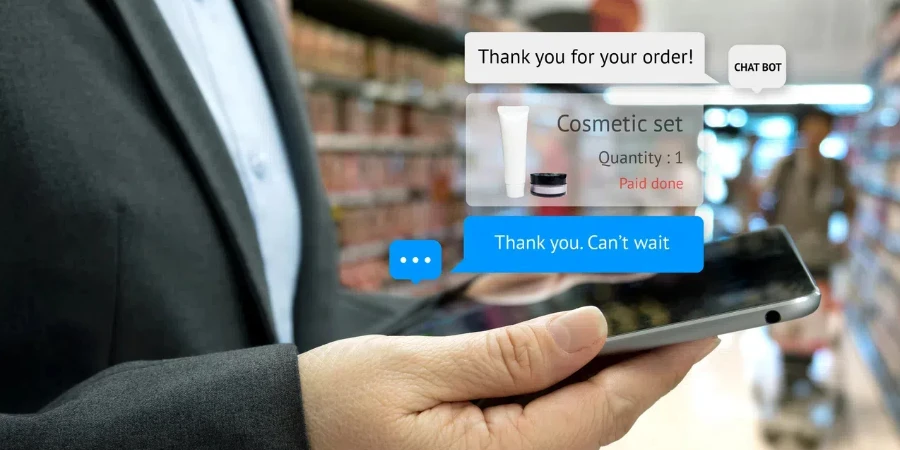Discover how retail can maximize AI chatbots to boost customer experience, streamline operations, and build trust.

The retail industry has undergone a profound transformation in the past decade, driven by heightened customer expectations and exciting technological advancements. The COVID-19 pandemic accelerated this trend, with many consumers, who were forced away from physical stores, remaining online since.
This shift to online purchasing has heightened demand for a seamless, efficient customer service experience. In response, the retail industry has been flooded with new technologies as companies of all sizes look to meet these expectations.
A popular approach deployed by businesses has been the introduction of chatbots. Chatbots have undergone significant transformation in the past decades. Beginning as complicated, hard-wired attempts at human-like computers, they have since transitioned through the voice-assistant era of Siri, Alexa and Cortana, to where we are today, with tools powered by artificial intelligence (AI) and integration capabilities.
Although these AI-enabled bots offer a wealth of benefits to the retail sector, not all companies are integrating them into their live ecommerce data. As a result, the true potential of retail chatbots is yet to be realised. With global retail spend on this technology expected to grow to $72 billion by 2028, now is the time for companies to consider where chatbots can add extra value, boost operational efficiency and offer more to customers.
Revolutionising customer experience
The most common application of chatbots in retail has been in customer service, where chatbots are used to answer customer queries as a way to minimise human headcounts and reduce costs. But in most cases, the reality has been that these offers are little more than conversational FAQs. While these may be sufficient in the first instance, if not updated with new customer data regularly they just end up frustrating customers and human intervention is ultimately required.
This being said, as more AI-powered chatbots have become integrated into product, order and personal data, personalised recommendations have seen great improvements. Personal and conversational AI helps brands better understand and engage with their customers. This enables them to tailor messages which resonate better with each customer and avoid back-and-forth on customer requests which means requests can be met more efficiently. With research revealing that 56% of consumers become repeat buyers after a personalised experience, brands which leverage these bots will likely see more loyalty and spending from customers.
We are confident about the unique quality of our Company Profiles. However, we want you to make the most beneficial decision for your business, so we offer a free sample that you can download by submitting the below formBy GlobalDataSubmit
This is even more significant in younger consumers – nearly half of Gen Z say they’re less likely to purchase after an impersonal experience.
Chatbots offer more benefits to consumers than just personalisation. They can provide information about nearby stores, guide customers through complex purchasing or returns processes and even support loyalty programs. AI bots also enable more targeted marketing, which decreases the amount of budget allocated to these business areas.
Natural language processing (NLP) chatbots are now coming to the fore, offering further benefits to the user experience. With the technology able to understand and respond to human speech, customers feel like they are communicating with a person which makes the purchasing experience more engaging.
Enhancing business efficiency
NLP and AI are now integrated into most backend systems like fulfilment, product and personalised data, offering serious operational benefits for companies. Able to provide round-the-clock personalised responses, chatbots can answer customer queries on areas including order tracking, purchase history, stock levels and offer recommendations. This information helps leaders make more informed decisions about business priorities such as product launches, stock renewal and returns – all without increasing headcount.
For industries like fashion and retail where waste and overproduction drain resources and revenue, this insight is even more valuable, helping keep costs down and boost profit.
Cutting costs at the customer’s expense
Despite their benefits, the retail industry has not fully embraced modern chatbots. Most retailers still rush through chatbot development and implementation, picking the cheapest and most cost-effective version. Even the most basic solutions cost around $10,000 and advanced NLP chatbots are significantly more – add on the necessary training and integration with existing systems and costs only increase.
While choosing the cheapest option may reduce costs, it comes at the expense of customer experience. Retailers which take this approach ultimately risk losing customers to competitors who utilise NLP and AI-enabled solutions and offer more effective and personalised experiences.
But can you really trust a Chatbot?
Trust is a factor holding back the successful use of chatbots in retail. Data breaches and privacy scandals continue to make headlines, with companies including VF Corporation, Staples and Forever 21 just a few victims of this activity. This has impacted how consumers think about their data – in 2023 23% of consumers were less comfortable about data being used for personalisation tools than in 2022.
As chatbots are driven by customer information, ensuring privacy and fostering trust should be top of mind for retailers using these solutions. Although 51% of consumers trust brands to keep personal data secure and use it responsibly for personalisation, businesses should consider how to be even more transparent with their customers. With trust set to be one of the biggest factors for the next generation of shoppers, retailers looking to stay ahead must act sooner rather than later.
What’s next for the Chatbot?
Automation is a powerful tool, but it cannot answer all needs. Purchasing remains an emotional experience where face-to-face interactions are still valued by customers. However, humans cannot operate at the same speed as automated solutions such as chatbots, nor can they process and analyse the volumes of data required to predict behaviour and answer queries in the same way AI can.
As consumer expectations around personalisation remain on an upward trajectory – with 71% of consumers expecting personalised interactions – chatbot usage across retail will increase. To meet this demand, the adoption of AI and NLP-enabled chatbots will be essential. With this technology able to provide more human-like, informed and emotional responses – these solutions are set to be the future of customer service.
The technology is there, and readily available for retailers. While embracing Chatbots will be key for success, a level of caution must be taken when implementing these solutions, to ensure the customer experience remains as human-like as possible.
About the author: Hetal Kurji-Evans is a director at Mindera, a global software development and technology consulting firm, specialising in high-performance, resilient, and scalable software systems.
Source from Retail Insight Network
Disclaimer: The information set forth above is provided by retail-insight-network.com independently of Alibaba.com. Alibaba.com makes no representation and warranties as to the quality and reliability of the seller and products. Alibaba.com expressly disclaims any liability for breaches pertaining to the copyright of content.




